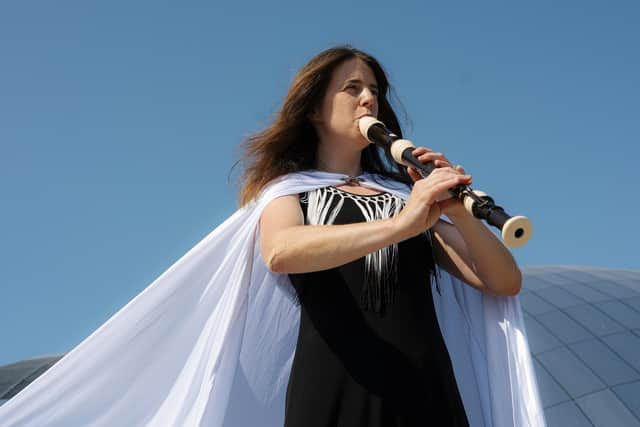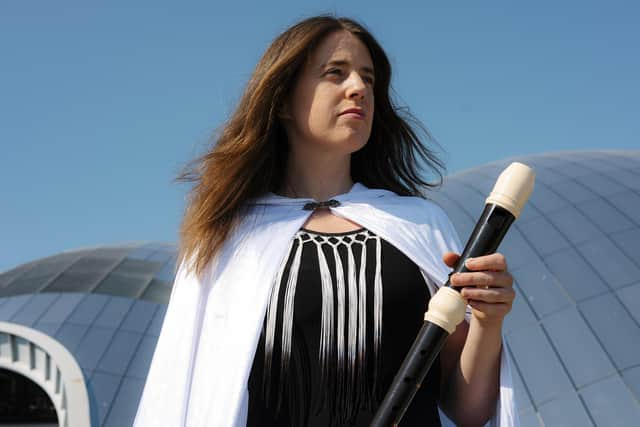How a 'one in 10m' diagnosis of music-triggered epilepsy led Liza Bec on a journey to create the robo-recorder
and live on Freeview channel 276
A prodigious musical talent, Liza, who grew up in North End and Waterlooville, recalls: ‘When I was 18-19, and playing piano while drunk, my hands would twitch, but I'd just think it was because I was drunk. I was at university once when it happened and someone said they thought I might have epilepsy, sort of as a joke. I didn't have any idea.’
It ultimately transpired that Liza has music-triggered epilepsy, a condition which affects only one in 10m people – but for each person there is a different trigger. For Liza it is triggered by playing certain patterns of notes.
Advertisement
Hide AdAdvertisement
Hide AdLiza, 42, was introduced to music from a young age – Liza’s parents noticed them dancing around to the records they played so thought they would try sending Liza to lessons with kindly neighbour Gwen Clutterbuck who would only charge the local children 50p a time. Liza remembers her fondly: ‘It was like her retirement project – she wanted to introduce kids to music, she was amazing. I learned piano, recorder and singing from the age of four because of her – we could never have afforded it otherwise.’


SEE ALSO: Police blighted by fake 999 calls
Liza went on to play with numerous local orchestras and bands while growing up, including particularly the Highbury Area Band, and took part in the Portsmouth Musical Festival.
‘Portsmouth was a great place to grow up musically, Highbury Area Band doesn't exist any more unfortunately, but it was a really amazing thing.’
Liza went to Portsmouth High School on a scholarship and remembers the help of another local musical luminary – Steve Tanner, founder of the Solent Symphony Orchestra and Liza’s clarinet teacher, who gave them one of his own clarinets.


Advertisement
Hide AdAdvertisement
Hide AdLiza achieved grade eight distinction on the recorder aged 12 and made their concerto debut with the band of the Royal Marines at the same age. The first person in their family to attend university, they studied geology at the University of Oxford. They then completed a masters in classical clarinet performance at Trinity College of Music, London, where they were awarded a distinction and the Hambleton Clarinet Prize.
But that problem with the twitching hands hadn’t gone away.
‘The first time I remember it being an issue on stage was when I graduated from music college. We were in Sweden, in a church, on tour. I had the music to sight-read, and I was paying with a new group. My hands went and I didn't have control over my muscles and I couldn’t breathe. It was really terrifying because I hadn't played with these people before. I got through it, but thought I must be going slightly mad and tried to put it out of my mind.
‘But it kept on happening and was getting worse and worse.
‘Then for orchestral auditions, I couldn't manage the excerpt, I was practicing and practicing and couldn't get through it – it was driving me insane. You've got to get through these auditions and play these pieces perfectly first time. But if your hands are twitching, you're stuffed. I was getting very frustrated with myself.
‘I was pushing it and pushing and wouldn't accept that my hands wouldn't do what I wanted because I'd spent years practicing – so I was going to practice until I got it right, but in that case that wasn't possible.
Advertisement
Hide AdAdvertisement
Hide Ad‘If you've got a glitch there and you're pushing it, you're making it worse.’
When they went to the hospital, Liza was initially told their seizure could have been caused by ‘blowing too hard’ while playing. Then they were told it could be a malignant brain tumour and to ‘prepare for the worst.’
It was in 2008 that Liza saw a specialist at Charing Cross: ‘He said actually, wait a second... he got my full history and did some investigations I ended up doing EEGs with silly hats on my head, and they saw the glitch when I was playing on the scans.
‘It was devastating.
‘I was told not to play – the more seizures you have, the more brain damage you cause. Every single one damages the surrounding brain tissue, and it puts you at higher risk of sudden death in epilepsy - it's significant risk, which they warn you about when you're diagnosed. Some people with epilepsy just have a terminal short circuit in their sleep and they don't wake up.
Advertisement
Hide AdAdvertisement
Hide Ad‘There's a significant risk of death in epilepsy if you've got uncontrolled seizures, so if you're having stuff that triggers seizures – don't do it! It's important to get good control.’
However, Liza refused to let the diagnosis stop them – in fact, they went to medical school to better understand the condition.
‘I still work part-time as a doctor and it's given me the flexibility to do both things and have a perspective on it from both sides, which is important. I was studying neuroscience and learning about neuroplasticity (the brain’s ability to rework neural networks) and I thought, right I can retrain my brain. I wanted to take part in a study, to do it in a scientific way, but there's no money for performing arts medicine.’
It was spotting an advert for a recorder player to help folk-collective The Memory Band with a music video that led Liza back to playing.
Advertisement
Hide AdAdvertisement
Hide Ad‘I looked at it and thought: “I'm going to do that”. I hadn't played for years, it was one of my friends from music college, and I just rocked up. It was all improvised, we just jammed and it went really well. I didn't have to play anything that triggered my seizures because I was making it all up and it was great. Then they asked if I wanted to join the band, and I ended up touring with them.’
From there Liza joined acclaimed electronic artist James Holden’s band, The Animal Spirits in 2017. ‘We toured for several years. I was now qualified as a doctor, so I was doing both things – two days in the surgery then off to Europe for the rest of the week and back again. It was a bit mad.’
Now as a solo artist, Liza gained funding from the Help Musicians UK Fusion Fund to produce Innervate, a short story and audio-visual installation about their experience of music-triggered epilepsy.
The music has been played on Liza’s own creation – the robo-recorder, which they built after being inspired by musician and experimental instrument-maker Leafcutter John, who had sought Liza’s advice on making ‘woodwind synths’.
Advertisement
Hide AdAdvertisement
Hide Ad‘I took what I had seen at his studio, put a circuit board on my recorder and just made the contact on there. It was that idea of building a very glitchy set-up. The computer listens to the notes I'm playing and that will change the synths, and I've got a whole lot of stuff in the computer I can switch on and off, and control the effects. It gives me a whole lot more control.’
The first single from Innervate, Revenge of The Dragoncat, is released this Friday, with the full EP following on February 10.
‘With Revenge of The Dragoncat, that’s the robo-recorder and drums – everything on the track is live. There's a lot of synths going on, but I'm controlling them all at the same time playing the recorder – that's what the robo-recroder does.’
Describing playing the robo-recorder, Liza says: ‘It's a little bit random and it's a bit like walking on a tightrope – it's a bit unpredictable. it's the opposite of classical music where you know exactly what's going to happen. Things can go wrong, and that's the point of it, it amplifies that and that's what I wanted to do with this.’
Advertisement
Hide AdAdvertisement
Hide AdThe robo-recorder is currently on display in the Science and Industry Museum in Manchester as part of an exhibition called Turn it Up: The Power of Music. It was also featured on Radio 6Music DJ Lauren Laverne’s show and put into her show’s hypothetical ‘6 Museum’.
‘I was super-excited about that because when I was growing up people were very down on recorders – "it's not a proper instrument" – and I think visibility's really important. I really struggled training when I was growing up, despite the kindness of people like Steve Tanner, it's really hard in classical music – you need a lot of money. I was just lucky that I had Gwen living opposite to help start me off, otherwise it's unaffordable for people from a lower-income background.
‘I think it's really important to say: “I can get on concert hall stage with a professional orchestra and play a plastic recorder, and I don't need anything else.” I'm choosing to play the recorder.
‘People were really engaging with it when I went up for the museum opening, like: “What's that? That's cool!” It's not just a thing kids bash each other on the head with.
Advertisement
Hide AdAdvertisement
Hide Ad‘I went to college to study clarinet, even though it's my fourth or fifth instrument – which is mad because I'm much better at the recorder. Getting epilepsy actually made me focus on what I'm good at and what I can do.’
Liza can now recognise the signs of impending trouble when playing music and modify their behaviour accordingly. ‘I do have problems sometimes, it depends on what I'm playing. The thing that's hard for me is if someone sticks a score in front of me and says: “Play that”. Yeah, I can read, and yeah, I can play it, but sometimes I'm going to have an issue.
‘I have to be able to say: “I'm going to have to miss that bit out”, and I'm very clear with people about that. It's difficult when you're working with classical people to say: “I'm going to miss that bit out", and it might not be the same part every time. It can depend on whether I've had enough sleep, what else is going on on stage, what have I just played, and I can feel when it's starting to happen, but I've got to have that flexibility to go: “Okay, I'm going to go off-piste here”. Off course jazzers are used to this sort of thing, which is why I end up playing more in that environment, and in electronic music, and improvisation. It's funny that I'm now bringing that back into the classical environment and fusing all of those skills.’
For more information go to lizabec.com.
Comment Guidelines
National World encourages reader discussion on our stories. User feedback, insights and back-and-forth exchanges add a rich layer of context to reporting. Please review our Community Guidelines before commenting.